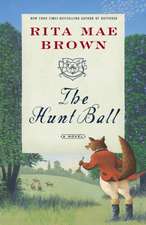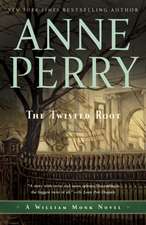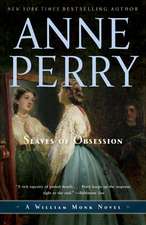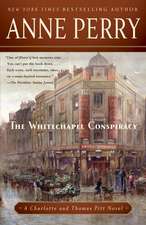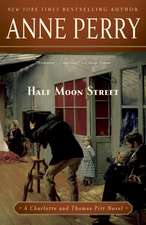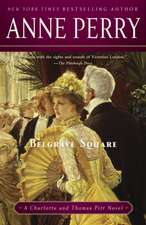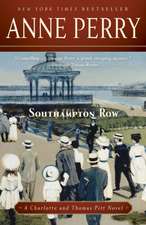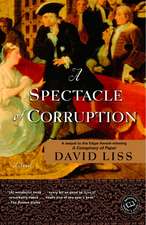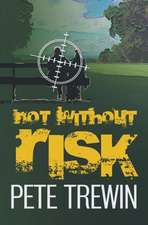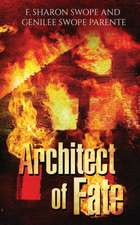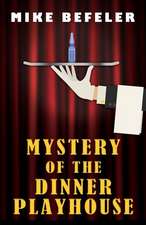Seven Dials: Charlotte & Thomas Pitt Novels (Paperback)
Autor Anne Perryen Limba Engleză Paperback – 30 sep 2011
Preț: 114.60 lei
Nou
Puncte Express: 172
Preț estimativ în valută:
21.93€ • 22.96$ • 18.14£
21.93€ • 22.96$ • 18.14£
Carte disponibilă
Livrare economică 15-29 martie
Preluare comenzi: 021 569.72.76
Specificații
ISBN-13: 9780345523716
ISBN-10: 0345523717
Pagini: 360
Dimensiuni: 130 x 201 x 23 mm
Greutate: 0.3 kg
Editura: BALLANTINE BOOKS
Seria Charlotte & Thomas Pitt Novels (Paperback)
ISBN-10: 0345523717
Pagini: 360
Dimensiuni: 130 x 201 x 23 mm
Greutate: 0.3 kg
Editura: BALLANTINE BOOKS
Seria Charlotte & Thomas Pitt Novels (Paperback)
Notă biografică
Among Anne Perry’s other novels featuring Thomas and Charlotte Pitt are Southampton Row, The Whitechapel Conspiracy, Half Moon Street, Bedford Square, and Brunswick Gardens. She also writes the popular novels featuring Victorian private investigator William Monk—among them, Death of a Stranger, Funeral in Blue, and Slaves of Obsession—as well as a new series set during World War One that began with No Graves As Yet. Her short story “Heroes” won an Edgar Award. Anne Perry lives in Scotland. Visit her Web site at www.anneperry.net.
From the Hardcover edition.
From the Hardcover edition.
Extras
Pitt opened his eyes but the thumping did not stop. The first gray of mid-September daylight showed through the curtains. It was not yet six, and there was someone at the front door.
Beside him, Charlotte stirred a little in her sleep. In a moment the knocking would waken her too. He slid out of bed and moved quickly across the floor and onto the landing. He ran down the stairs in his bare feet, snatched his coat off the rack in the hall, and with one arm through the sleeve, unbolted the front door.
"Good morning, sir," Jesmond said apologetically, his hand still in the air to knock again. He was about twenty-four, seconded from one of the local London police stations to Special Branch, and he considered it to be a great promotion. "Sorry, sir," he went on. "But Mr. Narraway wants you, straightaway, like."
Pitt saw the waiting hansom just beyond him, the horse fidgeting a little, its breath hanging vapor in the air. "All right," he said with irritation. It was not a particularly interesting case he was on, but he had it nearly solved; only one or two small pieces remained. He did not want a distraction now. "Come in." He gestured behind him towards the passage to the kitchen. "If you know how, you can riddle the stove and put the kettle on."
"No time, sir, beggin' your pardon," Jesmond said grimly. "Can't tell you wot it's about, but Mr. Narraway said ter come right away." He stood firmly on the pavement as if remaining rooted to the spot would make Pitt leave with him even sooner.
Pitt sighed and went back in, closing the door to keep the damp air out. He climbed the stairs, doffing his coat, and by the time he was in the bedroom, pouring water out of the ewer into the basin, Charlotte was sitting up in bed pushing her heavy hair out of her eyes.
"What is it?" she asked, although after more than ten years of marriage to him, first when he was in the police, now the last few months in the Special Branch, she knew. She started to get out of bed.
"Don't," he said quickly. "There's no point."
"I'll get you a cup of tea, at least," she replied, ignoring him and standing on the rug beside the bed. "And some hot water to shave. It'll only take twenty minutes or so."
He put down the ewer and went over to her, touching her gently. "I'd have had the constable do it, if there were time. There isn't. You might as well go back to sleep . . . and keep warm." He slid his arms around her, holding her close to him. He kissed her, and then again. Then he stepped back and returned to the basin of cold water and began to wash and dress, ready to report to Victor Narraway, as far as he knew, the head of the Secret Service in Queen Victoria's vast empire. If there was anybody above him, Pitt did not know of it.
Outside, the streets were barely stirring. It was too early for cooks and parlor maids, but tweenies, bootboys, and footmen were about, carrying in fresh coal, taking deliveries of fish, vegetables, fruit, and poultry. Areaway doors were open and sculleries were brightly lit in the shadows of the widening dawn.
It was not very far from Keppel Street, where Pitt lived in a modest but very respectable part of Bloomsbury, to the discreet house where Narraway currently had his offices, but it was already daylight when Pitt went in and up the stairs. Jesmond remained below. He had apparently finished his task.
Narraway was sitting in the big armchair he seemed to take with him from one house to another. He was slender, wiry, and at least three inches shorter than Pitt. He had thick, dark hair, touched with gray at the temples, and eyes so dark they seemed black. He did not apologize for getting Pitt out of bed, as Cornwallis, Pitt's superior in the police, would have done.
"There's been a murder at Eden Lodge," he said quietly. His voice was low and very precise, his diction perfect. "This would be of no concern to us, except that the dead man is a junior diplomat, of no particular distinction, but he was shot in the garden of the Egyptian mistress of a senior cabinet minister, and it seems the minister was unfortunately present at the time." He stared levelly at Pitt.
Pitt took a deep breath. "Who shot him?" he asked.
Narraway's eyes did not blink. "That is what I wish you to find out, but so far it unfortunately looks as if Mr. Ryerson is involved, since the police do not seem to have found anyone else on the premises, apart from the usual domestic servants, who were in bed. And rather worse than that, the police arrived to find the woman actually attempting to dispose of the body."
"Very embarrassing," Pitt agreed dryly. "But I don't see what we can do about it. If the Egyptian woman shot him, diplomatic immunity doesn't stretch to cover murder, does it? Either way, we cannot affect it."
Pitt would have liked to add that he had no desire or intention of covering the fact that a cabinet minister had been present, but he very much feared that that was exactly what Narraway was going to ask him to do, for some perceived greater good of the government or the safety of some diplomatic negotiation. There were aspects of being in Special Branch that he disliked intensely, but ever since the business in Whitechapel he had had little choice. He had been dismissed from his position as head of the Bow Street station, and had accepted secondment to Special Branch as protection for himself from the persecution that had followed his exposure of the Inner Circle's power and its crimes. His new assignment was the only avenue open to him in which he could use his skills to earn a living for himself and his family.
Narraway gave a slight smile, no more than an acknowledgment of a certain irony.
"Just go and find out, Pitt. She's been taken to the Edgware Road police station. The house is on Connaught Square, apparently. Somebody is spending a good deal of money on it."
Pitt gritted his teeth. "Mr. Ryerson, I presume, if she is his mistress. I suppose you are not saying that loosely?"
Narraway sighed. "Go and find out, Pitt. We need the truth before we can do anything about it. Stop weighing it and judging, and go and do your job."
"Yes, sir," Pitt said tartly, standing a little straighter for an instant before turning on his heel and going out, thrusting his hands into his jacket pockets and pushing the entire garment out of shape.
He set out along the street westward towards Hyde Park and the Edgware Road, intending to pick up a hansom as soon as he saw one.
There were more people around now, more traffic in the streets. He passed a newsboy with the earliest edition, headlining the threat of strikes in the cotton mills of Manchester. This problem had been grumbling on for a while, and looked like it was getting worse. Processing cotton was the biggest industry in the whole of the West Midlands, and tens of thousands of people made their living from it, one way or another. The raw cotton was imported from Egypt and woven, dyed and manufactured into goods there, then sold again all over the world. The damage of a strike would spread wide and deep.
There was a woman on the corner of the street selling hot coffee. The sky was calm and still, shredded with ragged clouds, but he was chilled enough to find the prospect of a hot drink welcome. There could well be no time for breakfast. He stopped.
"Mornin', sir," she said cheerfully, grinning to show two missing teeth. "Lovely day, sir. But a nip in the air, eh? 'Ow abaht an 'ot cup ter start the mornin'?"
"Yes, please."
"That'll be tuppence, sir." She held out a gnarled hand, fingers dark with the stain of the beans.
He gave her the money, and accepted the steaming coffee in return. He stood on the pavement, drinking slowly and thinking how he could approach the police when he reached the Edgware Road station. They would resent his interference, even if the case threatened to be so ugly they would be glad to pass the blame on to someone else. He knew how he had felt when he was in charge of Bow Street. Good or bad, he wanted to handle cases himself, not have his judgment overridden by senior officers who knew less of the area, of the details of the evidence, and who had not even met the people concerned, let alone questioned them, seen where they lived, who they cared for, loved, feared, or hated.
The cases he had handled so far in Special Branch were largely preventative: matters of finding men likely to incite violence and stir up the cold, hungry, and impoverished into riot. Occasionally he had been involved in the search for an anarchist or potential bomber. The Special Branch had been formed originally to combat the Irish Problem, and had had a certain degree of success, at least in keeping violence under control. Now its remit was against any threat to the security of the country, so possibly the fall of a major government figure could be scraped into that category.
He finished the coffee and handed the mug back to the woman, thanking her and continuing along the pavement. He took the last few yards at a run as he saw an empty hansom stop at the intersection, and he hailed the driver.
At the Edgware Road station an Inspector Talbot was in charge of the case and received Pitt in his office with barely concealed impatience. He was a man of middle height, lean as a whippet, with sad, slightly faded blue eyes. He stood behind his desk, piled with neatly handwritten reports, and stared at Pitt, waiting for him to speak.
"Thomas Pitt from Special Branch," Pitt introduced himself, offering his card to prove his identity.
Talbot's face tightened, but he waved a hand for Pitt to sit down in one of the rigid, hard-backed chairs. "It's a clean case," Talbot said flatly. "The evidence is pretty hard to misunderstand. The woman was found with the body, trying to move it. It was her gun that shot him, and it was in the barrow beside the body. Thanks to someone's quick thought, we got her in the act." The expression in his face was a challenge, daring Pitt to contradict such blatant facts.
"Whose honesty?" Pitt asked, but his stomach knotted up with foreknowledge of a kind of hopelessness already. This was going to be simple, ordinary and ugly, and as Talbot said, there was no way of evading it.
"Don't know," Talbot replied. "Someone raised the alarm. Heard the shots, they said."
"Raised the alarm how?" Pitt asked, a tiny prickle of curiosity awakened in him.
"Telephone," Talbot answered, catching Pitt's meaning instantly. "Narrows it down a bit, doesn't it? Before you ask, we don't know who. Wouldn't give a name, and apart from that, the caller was so alarmed the voice was hoarse-and so up and down the operator couldn't even say for sure whether it was a man or a woman."
"So the caller was close enough to be certain it was shots," Pitt concluded immediately. "How many houses have telephones within a hundred yards of Eden Lodge?"
Talbot pulled his mouth into a grimace. "Quite a few. Within a hundred and fifty yards, then, probably fifteen or twenty. It's a very nice area, lot of money. We'll try asking, of course, but the fact the caller didn't give a name means he or she wants to keep well out of it." He shrugged. "Pity. Might have seen something, but I suppose more likely they didn't. Body was found in the garden, well concealed by shrubbery, all leaves still on the trees, barely beginning to turn color. Laurels and stuff on the ground, evergreens."
From the Hardcover edition.
Beside him, Charlotte stirred a little in her sleep. In a moment the knocking would waken her too. He slid out of bed and moved quickly across the floor and onto the landing. He ran down the stairs in his bare feet, snatched his coat off the rack in the hall, and with one arm through the sleeve, unbolted the front door.
"Good morning, sir," Jesmond said apologetically, his hand still in the air to knock again. He was about twenty-four, seconded from one of the local London police stations to Special Branch, and he considered it to be a great promotion. "Sorry, sir," he went on. "But Mr. Narraway wants you, straightaway, like."
Pitt saw the waiting hansom just beyond him, the horse fidgeting a little, its breath hanging vapor in the air. "All right," he said with irritation. It was not a particularly interesting case he was on, but he had it nearly solved; only one or two small pieces remained. He did not want a distraction now. "Come in." He gestured behind him towards the passage to the kitchen. "If you know how, you can riddle the stove and put the kettle on."
"No time, sir, beggin' your pardon," Jesmond said grimly. "Can't tell you wot it's about, but Mr. Narraway said ter come right away." He stood firmly on the pavement as if remaining rooted to the spot would make Pitt leave with him even sooner.
Pitt sighed and went back in, closing the door to keep the damp air out. He climbed the stairs, doffing his coat, and by the time he was in the bedroom, pouring water out of the ewer into the basin, Charlotte was sitting up in bed pushing her heavy hair out of her eyes.
"What is it?" she asked, although after more than ten years of marriage to him, first when he was in the police, now the last few months in the Special Branch, she knew. She started to get out of bed.
"Don't," he said quickly. "There's no point."
"I'll get you a cup of tea, at least," she replied, ignoring him and standing on the rug beside the bed. "And some hot water to shave. It'll only take twenty minutes or so."
He put down the ewer and went over to her, touching her gently. "I'd have had the constable do it, if there were time. There isn't. You might as well go back to sleep . . . and keep warm." He slid his arms around her, holding her close to him. He kissed her, and then again. Then he stepped back and returned to the basin of cold water and began to wash and dress, ready to report to Victor Narraway, as far as he knew, the head of the Secret Service in Queen Victoria's vast empire. If there was anybody above him, Pitt did not know of it.
Outside, the streets were barely stirring. It was too early for cooks and parlor maids, but tweenies, bootboys, and footmen were about, carrying in fresh coal, taking deliveries of fish, vegetables, fruit, and poultry. Areaway doors were open and sculleries were brightly lit in the shadows of the widening dawn.
It was not very far from Keppel Street, where Pitt lived in a modest but very respectable part of Bloomsbury, to the discreet house where Narraway currently had his offices, but it was already daylight when Pitt went in and up the stairs. Jesmond remained below. He had apparently finished his task.
Narraway was sitting in the big armchair he seemed to take with him from one house to another. He was slender, wiry, and at least three inches shorter than Pitt. He had thick, dark hair, touched with gray at the temples, and eyes so dark they seemed black. He did not apologize for getting Pitt out of bed, as Cornwallis, Pitt's superior in the police, would have done.
"There's been a murder at Eden Lodge," he said quietly. His voice was low and very precise, his diction perfect. "This would be of no concern to us, except that the dead man is a junior diplomat, of no particular distinction, but he was shot in the garden of the Egyptian mistress of a senior cabinet minister, and it seems the minister was unfortunately present at the time." He stared levelly at Pitt.
Pitt took a deep breath. "Who shot him?" he asked.
Narraway's eyes did not blink. "That is what I wish you to find out, but so far it unfortunately looks as if Mr. Ryerson is involved, since the police do not seem to have found anyone else on the premises, apart from the usual domestic servants, who were in bed. And rather worse than that, the police arrived to find the woman actually attempting to dispose of the body."
"Very embarrassing," Pitt agreed dryly. "But I don't see what we can do about it. If the Egyptian woman shot him, diplomatic immunity doesn't stretch to cover murder, does it? Either way, we cannot affect it."
Pitt would have liked to add that he had no desire or intention of covering the fact that a cabinet minister had been present, but he very much feared that that was exactly what Narraway was going to ask him to do, for some perceived greater good of the government or the safety of some diplomatic negotiation. There were aspects of being in Special Branch that he disliked intensely, but ever since the business in Whitechapel he had had little choice. He had been dismissed from his position as head of the Bow Street station, and had accepted secondment to Special Branch as protection for himself from the persecution that had followed his exposure of the Inner Circle's power and its crimes. His new assignment was the only avenue open to him in which he could use his skills to earn a living for himself and his family.
Narraway gave a slight smile, no more than an acknowledgment of a certain irony.
"Just go and find out, Pitt. She's been taken to the Edgware Road police station. The house is on Connaught Square, apparently. Somebody is spending a good deal of money on it."
Pitt gritted his teeth. "Mr. Ryerson, I presume, if she is his mistress. I suppose you are not saying that loosely?"
Narraway sighed. "Go and find out, Pitt. We need the truth before we can do anything about it. Stop weighing it and judging, and go and do your job."
"Yes, sir," Pitt said tartly, standing a little straighter for an instant before turning on his heel and going out, thrusting his hands into his jacket pockets and pushing the entire garment out of shape.
He set out along the street westward towards Hyde Park and the Edgware Road, intending to pick up a hansom as soon as he saw one.
There were more people around now, more traffic in the streets. He passed a newsboy with the earliest edition, headlining the threat of strikes in the cotton mills of Manchester. This problem had been grumbling on for a while, and looked like it was getting worse. Processing cotton was the biggest industry in the whole of the West Midlands, and tens of thousands of people made their living from it, one way or another. The raw cotton was imported from Egypt and woven, dyed and manufactured into goods there, then sold again all over the world. The damage of a strike would spread wide and deep.
There was a woman on the corner of the street selling hot coffee. The sky was calm and still, shredded with ragged clouds, but he was chilled enough to find the prospect of a hot drink welcome. There could well be no time for breakfast. He stopped.
"Mornin', sir," she said cheerfully, grinning to show two missing teeth. "Lovely day, sir. But a nip in the air, eh? 'Ow abaht an 'ot cup ter start the mornin'?"
"Yes, please."
"That'll be tuppence, sir." She held out a gnarled hand, fingers dark with the stain of the beans.
He gave her the money, and accepted the steaming coffee in return. He stood on the pavement, drinking slowly and thinking how he could approach the police when he reached the Edgware Road station. They would resent his interference, even if the case threatened to be so ugly they would be glad to pass the blame on to someone else. He knew how he had felt when he was in charge of Bow Street. Good or bad, he wanted to handle cases himself, not have his judgment overridden by senior officers who knew less of the area, of the details of the evidence, and who had not even met the people concerned, let alone questioned them, seen where they lived, who they cared for, loved, feared, or hated.
The cases he had handled so far in Special Branch were largely preventative: matters of finding men likely to incite violence and stir up the cold, hungry, and impoverished into riot. Occasionally he had been involved in the search for an anarchist or potential bomber. The Special Branch had been formed originally to combat the Irish Problem, and had had a certain degree of success, at least in keeping violence under control. Now its remit was against any threat to the security of the country, so possibly the fall of a major government figure could be scraped into that category.
He finished the coffee and handed the mug back to the woman, thanking her and continuing along the pavement. He took the last few yards at a run as he saw an empty hansom stop at the intersection, and he hailed the driver.
At the Edgware Road station an Inspector Talbot was in charge of the case and received Pitt in his office with barely concealed impatience. He was a man of middle height, lean as a whippet, with sad, slightly faded blue eyes. He stood behind his desk, piled with neatly handwritten reports, and stared at Pitt, waiting for him to speak.
"Thomas Pitt from Special Branch," Pitt introduced himself, offering his card to prove his identity.
Talbot's face tightened, but he waved a hand for Pitt to sit down in one of the rigid, hard-backed chairs. "It's a clean case," Talbot said flatly. "The evidence is pretty hard to misunderstand. The woman was found with the body, trying to move it. It was her gun that shot him, and it was in the barrow beside the body. Thanks to someone's quick thought, we got her in the act." The expression in his face was a challenge, daring Pitt to contradict such blatant facts.
"Whose honesty?" Pitt asked, but his stomach knotted up with foreknowledge of a kind of hopelessness already. This was going to be simple, ordinary and ugly, and as Talbot said, there was no way of evading it.
"Don't know," Talbot replied. "Someone raised the alarm. Heard the shots, they said."
"Raised the alarm how?" Pitt asked, a tiny prickle of curiosity awakened in him.
"Telephone," Talbot answered, catching Pitt's meaning instantly. "Narrows it down a bit, doesn't it? Before you ask, we don't know who. Wouldn't give a name, and apart from that, the caller was so alarmed the voice was hoarse-and so up and down the operator couldn't even say for sure whether it was a man or a woman."
"So the caller was close enough to be certain it was shots," Pitt concluded immediately. "How many houses have telephones within a hundred yards of Eden Lodge?"
Talbot pulled his mouth into a grimace. "Quite a few. Within a hundred and fifty yards, then, probably fifteen or twenty. It's a very nice area, lot of money. We'll try asking, of course, but the fact the caller didn't give a name means he or she wants to keep well out of it." He shrugged. "Pity. Might have seen something, but I suppose more likely they didn't. Body was found in the garden, well concealed by shrubbery, all leaves still on the trees, barely beginning to turn color. Laurels and stuff on the ground, evergreens."
From the Hardcover edition.
Recenzii
“Terrific, vivid stuff . . . Prolific Anne Perry [is] a master of the genre.”—The Seattle Times
“Intricately layered . . . The visual panorama is voluptuous to behold.”—The New York Times Book Review
“Perry’s as good as it gets. . . . The final courtroom scene produces more victims and left me breathless.”—Providence Journal
“Captivating . . . offers an added dollop of historical interest, immersing both Pitt and the reader in the intrigue and seething atmosphere of Egypt.”—Spartanburg Herald-Journal
“One of the best [novels] that Perry has written.”—The Historical Novels Review
“Intricately layered . . . The visual panorama is voluptuous to behold.”—The New York Times Book Review
“Perry’s as good as it gets. . . . The final courtroom scene produces more victims and left me breathless.”—Providence Journal
“Captivating . . . offers an added dollop of historical interest, immersing both Pitt and the reader in the intrigue and seething atmosphere of Egypt.”—Spartanburg Herald-Journal
“One of the best [novels] that Perry has written.”—The Historical Novels Review




















